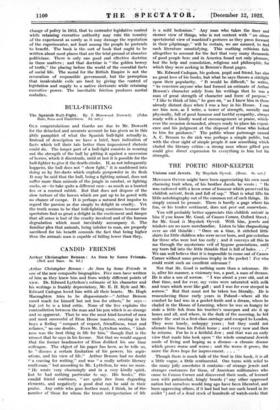CANDID FRIENDS
Arthur Christopher Benson : As Seen by Some Friends. (Bell and Sons. Ss. 6d.)
Arthur Christopher Benson : As Seen by Some Friends is one of the new composite biographies. Five men have written of him as they knew him and from widely different points of view. Dr. Edward Lyttelton's estimate of his, character and his writings is frankly depreciatory, Mr. E. H. Ryle and Mr. Edward Cadogan loved him with all their hearts. Mr. Hugh Maenaghten tries to be dispassionate—" Arthur Benson cared much for himself but not less for others," he says--- bat yet he is a kind critic. None of the five explains the contradiction between the man and his pen which is so strange and so apparent. That he was the most kind-hearted of men and most successful of Eton House masters, creating in his boys a feeling " compact of respect, friendliness, trust and reliance," no one doubts. Even Mr. Lyttelton writes, " kind- ness was the best thing in life for him," though that is the utmost that he says in his favour. Not that we would suggest that the former headmaster of Eton disliked his one time colleague. The object of his paper has been, -as -he tells us, to " discuss a certain limitation of his powers, his aspir- ations, and his view of life." Arthur Benson had no doubt !‘ a craving for writing," and was " a really artistic literary craftsman," but according to Mr. Lyttelton, he was no more. " IIC wrote very charmingly and in a very kindly spirit, but he had nothing particular to say. His books," this candid friend continues, " are quite free from- d_egrad'ng elements, and negatively a good deal can be said in their praise. Any critic who goes further must, I think, be of the-, number of those for whom the truest interpretation of life is a mild hedonism." Any man who -takes the finer and sterner view of things, who is not content with " an otiose spectatorial view of mankind's gestures as they press forward in their pilgrimage," will be certain, we are assured, to find such literature unsatisfying. This scathing criticism fails altogether to account for the fact that very many thousands of good people here and in America found not only pleasure, but the help and consolation, religious and philosophic, for which they were seeking in Benion's fluent pages.
Mr. Edward Cadogan, his godson, pupil and friend, has also no great love of his books, but what he says throws a sidelight upon their popularity. " It would be difficult," he writes, " to convince anyone who had formed an estimate of Arthur Benson's character solely from his writings that he was a man of great strength of character and force of purpose." " I like to think of him," he goes on, " as I knew him in those already distant days when I was a boy in his House. I can see him now, as I write, a tower of strength, morally and physically, full of good humour and tactful sympathy, always ready with a kindly word of encouragement or praise, which-. ever the occasion demanded, always ready to-place his experi- ence and his judgment at the disposal of those who looked to him for guidance." The public whose patronage caused A. C. Benson to die rich was perhaps a simple public, but with the clear sight of simple people it saw something which eluded the literary critics—a strong man whose gifted pen could give direct expression to everything in him, but his strength.






















































 Previous page
Previous page